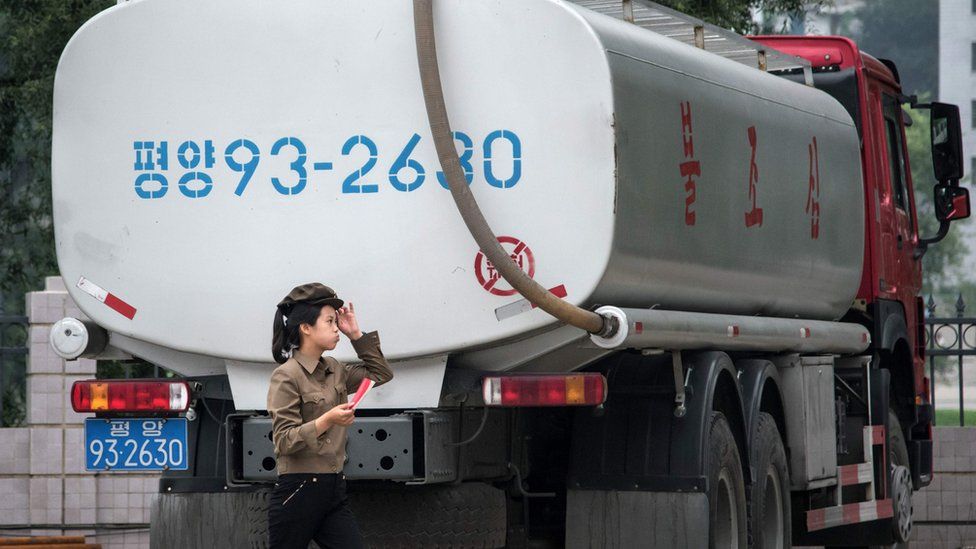China limits oil trade to North Korea and bans textile trade
- Published

China has moved to limit North Korea's oil supply and will stop buying textiles from the politically isolated nation, it said on Saturday.
China is North Korea's most important trading partner, and one of its only sources of hard currency.
The ban on textiles trade will hurt Pyongyang's income, while China's oil exports are the country's main source of petroleum products.
The tougher stance follows North Korea's latest nuclear test this month.
The United Nations agreed fresh sanctions - including the textiles and petroleum restrictions - in response.
Was your T-shirt made in North Korea?
A statement from China's commerce ministry said restrictions on refined petroleum products would apply from 1 October, and on liquefied natural gas immediately.
Under the UN resolution, China will still be able to export a maximum of two million barrels of refined petroleum to North Korea annually, beginning next year.
North Korea is estimated to have imported 6,000 barrels of refined petroleum daily from China in 2016 - the equivalent of nearly 2.2 million in total for the entire year.
But China has not published data on oil exports since 2014.
The ban on textiles - Pyongyang's second-biggest export - is expected to cost the country more than $700m (£530m) a year.
Clothing has often partially been made in North Korea, but finished in China, allowing a Made in China label to be legally sewn onto the clothing, BBC World Service Asia-Pacific Editor Celia Hatton says.
China and Russia had initially opposed a proposal from the US to completely ban oil exports, but later agreed to the reduced measures.
North Korea has little energy production of its own, but does refine some petroleum products from crude oil it imports - which is not included in the new ban.
Petrol prices in Pyongyang have risen by about 20% in the past two months, the AFP news agency reports.
"It was $1.90 yesterday, today it is $2," a petrol station employee told the agency. "I expect the price will go up in the future."
North Korea also produces coal, some $1.2bn of which was exported to China in 2016, but China had already strictly limited its imports of North Korean coal earlier this year.
North Korea's foreign minister is expected to speak at the United Nations General Assembly later on Saturday, amid an escalating war of words between Kim Jong-un and Donald Trump.
The North Korean leader earlier labelled Mr Trump "mentally deranged" and a "dotard" while Mr Trump labelled Mr Kim a "madman" in response.
Russia's foreign minister, Sergei Lavrov, said the row was "like when children in a kindergarten start fighting and no-one can stop them".
Mr Lavrov said a pause was needed, "to calm down the hotheads".
Trump: 'Rocket Man's suicide mission'
The pair were at odds over President Trump's speech at the United Nations General Assembly, in which he threatened to "totally destroy" North Korea if forced to do so in defence of the US or its allies.
He also mocked Kim Jong-un with a disparaging nickname, saying: "Rocket man is on a suicide mission."
But the North Korean leader said remarks by the "deranged" US president convinced him he is right to develop weapons for North Korea.
In a personal address unprecedented from a North Korean leader, Mr Kim said Mr Trump would "pay dearly" for his speech, which he labelled "unprecedented rude nonsense".
He said Mr Trump had insulted his country in the eyes of the world, and threatened to "surely and definitely tame the mentally deranged US dotard with fire".
- Published19 September 2017
- Published15 September 2017
- Published5 September 2023
- Published21 April 2020
- Published4 September 2017
- Published30 August 2017